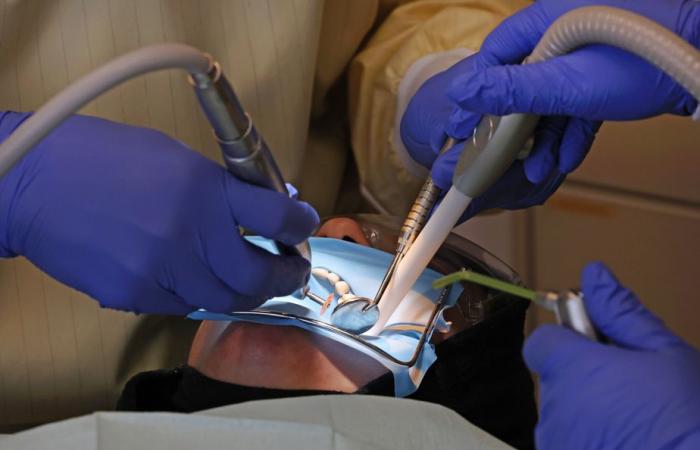Children, seniors and people with disabilities are struggling to access dental care due to disputes between the Trudeau and Legault governments. Quebec prohibits its health establishments from managing claims to the federal dental care plan, judging that this is an interference in its field of jurisdiction.
Posted at 1:16 a.m.
Updated at 5:00 a.m.
“I find this odious and unworthy of the Minister of Health. It’s petty politics on the backs of the poor,” deplores the president of the Association of Dental Surgeons of Quebec (ACDQ), Dr.r Carl Tremblay.
The Canadian Dental Care Plan (CDCP), which came into force on 1is last May, aims to provide dental care coverage to Canadian residents whose adjusted net family income is less than $90,000 and who do not have access to dental insurance. The plan is currently available to seniors, children and people with disabilities. It will gradually be expanded to all age groups in the coming months.
However, Quebec considers that the new regime constitutes an interference in its field of jurisdiction in matters of health. The Ministry of Health and Social Services (MSSS) therefore prohibits this program from being used in its health establishments, such as community clinics, dental departments of hospitals or CHSLDs. However, patients in private clinics have access to them.
“We are depriving patients of a program for which they paid taxes like all Canadians. It’s unfair,” said the Dr Tremblay. This is particularly the case for CHSLD patients who do not have access to the federal program due to the Quebec directive. “They are prisoners of the establishment in which they were placed. » The directive is also denounced by the FADOQ Network.
Last May, Minister Christian Dubé accused family doctors of taking the population hostage during negotiations with the Federation of General Practitioners of Quebec (FMOQ). “There, he does the same thing with a vulnerable population, the less fortunate,” says the Dr Tremblay.
An “excessively harmful” directive
Children and people with disabilities are also affected by this directive. “I would like all children to have access to the care they need. If the patient can benefit from any help, I hope he can have access to it,” says the pediatric dentist and head of the department of dentistry at CHU Sainte-Justine, Dr.re Marie-Eve Asselin. She recalls that one of the main barriers for dental care is the financial aspect.
PHOTO ALAIN ROBERGE, LA PRESSE ARCHIVES
The Dre Marie-Eve Asselin, pediatric dentist and head of the department of dentistry at CHU Sainte-Justine
“It’s excessively harmful,” denounces the general director of the Provincial Regroupment of Users’ Committees, Sylvie Tremblay.
Dental problems are often a cause of extraordinary suffering for many people with disabilities, particularly people who are non-verbal and have intellectual problems. They should have access to the plan.
Sylvie Tremblay, general director of the Provincial Regroupment of Users’ Committees
From one end of the province to the other, dentists are sorry not to be able to register their patients with the federal plan. “Patients are complaining. But we can’t do anything. We cannot go against the Ministry,” says a dentist who works in the dental department of a hospital center, who is not authorized to speak publicly.
Several of his patients would however have access to the program. “We have to explain to them that it doesn’t work. It’s frustrating. Especially since there is no alternative to offer them,” he says.
Patients penalized
Patients at the community dental clinic in Sainte-Anne-des-Monts, in Gaspésie, struggle to afford certain dental care due to lack of financial means.
“It’s an aberration. Once again, we are being served the poutine of war between Ottawa and Quebec, but it is the people of my population who are penalized,” says the mayor of Sainte-Anne-des-Monts, Simon Deschênes.
In recent weeks, the mayor has been contacted by several citizens, upset by this directive. He is concerned to see them “deserting the community clinic to return to the private sector, or even sometimes outside the region”, in order to ensure they have access to the plan.
“We understand that this may cause inconvenience and we apologize for it,” Lou Landry, assistant to the CEO and responsible for communications at the CISSS de la Gaspésie, said by email.
Negotiations in progress
The Legault government wants to withdraw from the federal program and obtain compensation to improve its own programs. Negotiations with Ottawa are still ongoing. The MSSS does not want to comment on the progress of the discussions. For its part, Health Canada says it is open to removing Quebec from the program provided that it offers the same level of care as that offered by the plan.
Without wanting to take a clear position on the situation, the Order of Dentists of Quebec says it hopes “that the interests of patients are put before political interests, and that all Quebecers eligible for dental care coverage can benefit from it,” declared has The Press its president, Liliane Malczewski. She points out that oral health has a direct impact on the overall health of individuals.
For its part, the Trudeau government “firmly believes that Quebecers should have access to quality and affordable dental care at the same level as all Canadians,” declared the spokesperson for Canada’s Minister of Health, Guillaume Bertrand.
Who has access to the federal dental care plan?
The federal plan is currently available to people aged 65 and over, children under 18 and people with disabilities who do not have private insurance and who have an adjusted net family income of less than 90,000 $. By spring 2025, the program is expected to be eligible for all age groups who meet these criteria.
The story so far
1is May
The Canadian Dental Care Plan (CDCP) comes into effect. Only people aged 65 and over are eligible.
June 14
The MSSS asks establishments in the health and social services network not to manage claims with the dental care plan.
June 27
The scheme is extended to children and people with disabilities.
Learn more
-
- 818 000
- Number of Quebecers registered in the new federal dental care plan. Among them, 250,000 have already received care.
source: Office of the Minister of Health of Canada







